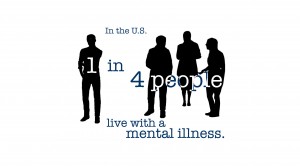
Wednesday night’s mental illness student panel hosted by Concordia’s Active Minds drew a crowd that required a switch to a larger venue not once, but twice to accommodate the turnout. A parade of approximately 200 students shuffled through the halls of Jones Science building, moving from room to room, vying for seats, and eager to hear the stories from their brave peers.
These peers were seven Concordia students who were given an opportunity to voice their experiences with mental illness, sharing with the Concordia community their struggles, recovery, and articulating how they combated the stigma surrounding their mental health issues.
The student panel represented seven different forms of mental illness, including anxiety, bipolar disorder, depression, eating disorder, post traumatic stress disorder and pervasive developmental disorder. Panelists discussed their experiences and how they overcame the social stigmas surrounding their particular disorder.
Senior Jenna Kamholz President of Concordia’s Active Minds said that the student panel event falls in line with the main goal of the organization, which Kamholz succinctly stated: ”to reduce stigma in mental health.”
Kamholz stressed that movies often sensationalize mental illness and provide false perceptions about mental illness.
“Don’t believe movies and tv shows and books because that isn’t what mental health is,” Kamholz said.
Vice-President of Active Minds, Laura Clark, a senior, agreed that movies often perpetuate false perceptions about mental illnesses. It is important for people not to accept these false portrayals but instead take the time to learn more about mental illnesses.
“A certain treatment in a movie could be completely different for what it is for you,” Kamholz said.
According to the Mayo Clinic’s website, about 1 in 4 adults has a mental illness in any given year. About half of U.S. adults will develop a mental illness sometime in their lives and mental illness can begin at any age, from childhood through later adult years.
The panel followed a question and answer format, and was moderated by Kamholz. Each of the seven students took turns answering questions and following the panel discussion, the audience was welcome to ask questions.
One of the aspects panelists shared with audience members was the treatment they underwent or are now using to help them overcome their mental illness.
Rachael Cammarn was one of the student panelists and discussed her experiences with post-traumatic stress disorder. Cammarn was seated among her fellow panelists, but unlike her fellow panelists, she held a leash to her dog.
“As most of you notice, I have a dog. She is actually a part of my treatment plan,” Cammarn said. “She wakes me up if I’m having a nightmare … and if she senses that I’m getting anxious, she’ll touch me somehow–like right now she’s laying on my foot because she senses I’m a little anxious.”
Cammarn refers to her sheltie as her little helper.
“For me, my treatment plan has been my little helper, my medication, and my therapy,” she said.
Cammarn said that discussion about mental illness can help combat the stigma and guilt that often goes along with having the illness.
“Talking about it (and) creating this open dialogue will help us overcome the shame we can sometimes feel when we have these disorders,” Cammarn said.
Megan Schindler, another panelist agreed, sharing the importance of open communication.
“I think everyone has this basic need to be understood and one of the things to help people understand your life experiences is to talk about it,” Schindler said.
Clark explained that in addition to being equipped with various resources, Active Minds also works closely with the counseling center. Members of the counseling center were present during the panel event as well.
“(Active Minds) is there to give you resources, to get help, and to talk about (mental health issues),” Clark said. “We have resources if you need counseling and therapy help.”
Kamholz said that Active Minds is an important organization because it provides a platform where students feel free to discuss mental health issues, explore ways to reduce stigma, and are provided with resources for help.
“This (event) is allowing students at Concordia to share their experiences (about) their own mental health,” Kamholz said.
Kamholz is appreciative of those who are willing to learn more about mental illness.
“(I want to) thank everyone for hearing stories and listening and taking mental illness seriously,” Kamholz said.
Likewise, Sydney Gisvold, another student panelist at the event stressed the importance of treating mental health issues seriously.
“When someone tries to share their struggles with you, take it seriously. Let them know that they are genuinely trying to reach out for help and asking for you to be a friend. It’s really important to open up the conversation,” Gisvold said.
Clark hopes that the panel event showed individuals with mental illness that it is okay to reach out for assistance. She encourages education to reduce the stigmas surrounding mental health.
“Educate yourself to know about different illnesses because they are so much more common than people think.” Clark said.

